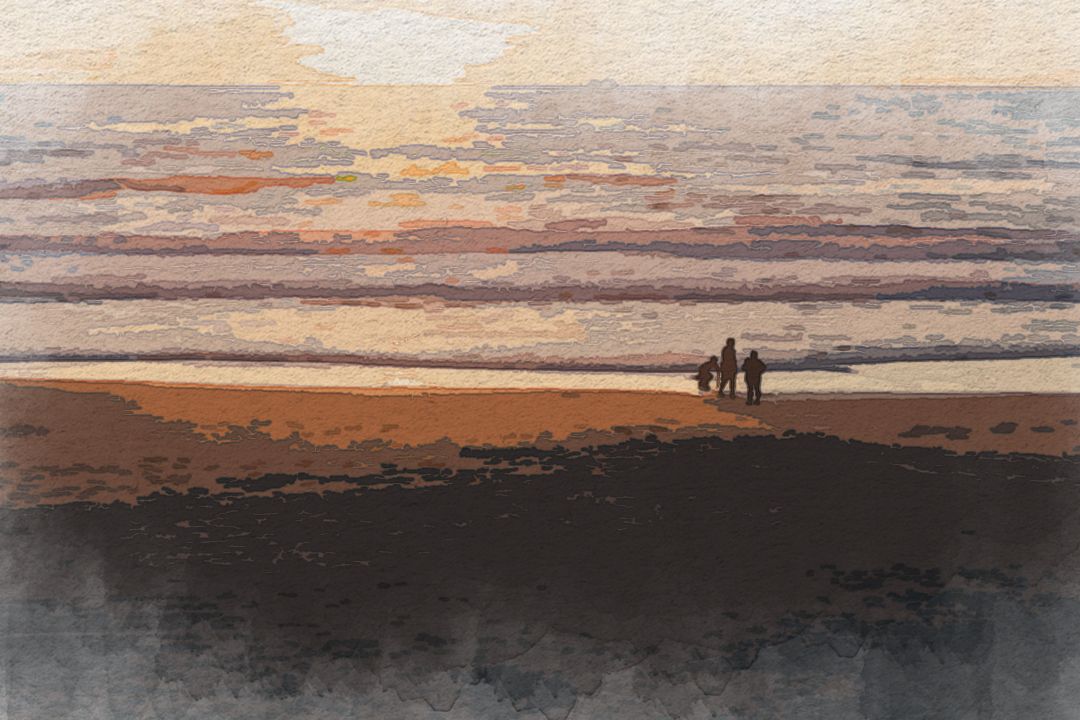A Focal Point for the Mind

Look! The Horizon Lowers the Ship
On a magnificent day, the sun hung low in the sky, casting a warm golden glow upon the vast expanse of sandy shores. In the background, an enormous cruise ship adorned the distant seas, its majestic presence overshadowed only by the brilliance of the day. The sea breeze whispered tales of adventure, and the rhythmic waves played a melody that seemed to echo through time.
A parent walked along the beach with two children, their laughter harmonizing with the soothing sounds of the ocean. The grains of sand cradled their footsteps as they strolled, creating a serene tableau against the backdrop of the expansive sea. The tranquillity of the scene masked the profundity of the moment, destined to be etched into the canvas of memory.
Nothing contributes so much to tranquillize, the mind as a steady purpose, a point on which the soul may fix its intellectual eye.
— Mary Shelley (1797-1851)
... whispered the parent, their gaze fixed on the horizon. It was a sentiment that encapsulated the essence of the day, a day where purpose and presence converged, grounding them in the beauty of the present.
As the sun descended, the image of the beach faded, much like the ephemeral nature of cherished memories. The children, engrossed in their playful endeavours, unknowingly created imprints in the sands of time. The parent, acutely aware of the transient quality of such moments, savoured the passage of time, finding solace in the steady purpose that anchored their thoughts.
We must always tell what we see. Above all, and this is more difficult, we must always see what we see.
— Charles Péguy's (1873-1914)
... echoed through the parent's mind as they watched the scene unfold. The day's beauty was not merely in its external manifestation but in the conscious act of truly seeing and appreciating the fleeting moments that composed it.
In the next frame of this visual narrative, the focus shifted back, and the son stood alone on the horizon, contemplating the distant cruise ship. The vastness of the sea mirrored the undiscovered truths that lay ahead, challenging the child and their parent to see beyond the surface of their experiences.
To myself, I am only a child playing on the beach while vast oceans of truth lie undiscovered before me.
— Isaac Newton (1643-1727)
... mused the older child, their gaze fixed on the distant ship. The simplicity of the statement carried a profound weight, acknowledging the vast expanse of knowledge and experience that awaited them on the journey of life.
The sinking ship became a metaphor for life's inevitable challenges, each wave a reminder of the unpredictable nature of the human experience.
Never give up, for that is the place and time the tide will turn.
— Harriet Beecher Stowe (1811-1896)
... echoed the younger child, their resilient spirit reflecting the wisdom learned from the rhythmic dance of the waves.
As thoughts intertwined with reality, the parent, gazing at the horizon, contemplated the interconnectedness of life, recalling a fundamental truth.
Mathematical science is the place and time, an indivisible whole, an organism whose vitality is conditioned upon the connection of its parts.
— David Hilbert (1862-1943)
In this evolving tale, the consistent theme prevailed: Look! The Horizon Lowers the Ship. The family embraced the beauty of the moment, the wisdom of steady purpose, and the resilience needed to navigate the ebb and flow of life. As the sun dipped below the horizon, the memory of the day etched itself into the sands of time, leaving an indelible mark on the canvas of their shared journey.
Once a stage for joy and laughter, the beach transformed into a reflective space as the family gathered near the water's edge. The fading sunlight painted the sky in hues of orange and pink, casting a warm glow on the faces of the parent and children. Seagulls, with wings painted in the last strokes of daylight, soared above, adding a sense of serenity to the moment.
Nothing contributes so much to tranquillize the mind as a steady purpose, a point on which the soul may fix its intellectual eye.
— Mary Shelley (1797-1851)
The children, their eyes reflecting innocence and curiosity, looked to the horizon where the sinking ship had become a distant silhouette against the fading light.
We must always tell what we see. Above all, and this is more difficult, we must always see what we see.
— Charles Péguy's (1873-1914)
The older child, a budding philosopher in the making, pointed to the horizon and remarked,
To myself, I am only a child playing on the beach while vast oceans of truth lie undiscovered before me.
— Isaac Newton (1643-1727)
With unbridled optimism, the younger child added,
Never give up, for that is the place and time the tide will turn.
— Harriet Beecher Stowe (1811-1896)
The parent, appreciating the resilience inherent in such a perspective, smiled, realizing that the wisdom of the young could often surpass the complexities of adulthood.
Now seated in the sand, the family continued contemplating the sea and its mysteries. The parent, their gaze fixed on the vastness before them, found solace in the notion that life's challenges were as inevitable as the ebb and flow of the tides.
Mathematical science is the place and time, an indivisible whole, an organism whose vitality is conditioned upon the connection of its parts.
— David Hilbert (1862-1943)
As the night unfolded its velvet curtain, the stars emerged individually, decorating the sky in a celestial display. The family, wrapped in the quietude of the moment, felt a profound connection to the universe. The distant sound of waves crashing against the shore served as a lullaby, gently guiding them into a contemplative state.
The parent, looking at the children nestled against the backdrop of the cosmic tapestry, couldn't help but feel a deep sense of gratitude. The steady purpose that anchored them throughout the day now merged with the tranquillity of the night, creating a seamless continuum of experience.
In the vastness of the universe, they were but a fleeting moment, a mere collection of stardust navigating the cosmic expanse. The enormity of the night sky emphasized the humility encapsulated in the words,
To myself, I am only a child playing on the beach while vast oceans of truth lie undiscovered before me.
— Isaac Newton (1643-1727)
The parent marvelled at the endless possibilities ahead, much like the unexplored realms of the ocean.
The children, nestled against the parent, felt the gentle rhythm of their breaths synchronizing with the natural cadence of the sea. The night, now deep and contemplative, whispered its truths.
Never give up, for that is the place and time In my opinion, mathematical science is the tide will turn.
— Harriet Beecher Stowe (1811-1896)
As the night unfolded, the parent and children lay under the star-studded sky, their silhouettes blending with the shadows cast by the moon. The beauty of the day, the wisdom gained, and the interconnectedness of experiences formed a tapestry of memories that transcended the boundaries of time.
The next morning greeted them with a gentle sunrise, painting the sky in hues of pink and orange. Now bathed in the soft light, the beach seemed to hold the promise of new beginnings. The family, rejuvenated by the quiet reflection of the night, rose to embrace the day.
With a renewed sense of purpose, the parent led the children back towards the shore. The vast sea stretched before them, a canvas waiting to be filled with the imprints of their footsteps. The sinking ship, now a distant memory, served as a reminder of the transient nature of challenges.
Nothing contributes so much to tranquillize the mind as a steady purpose, a point on which the soul may fix its intellectual eye.
— Mary Shelley (1797-1851)
The family, now united by the shared experiences of the day and night, stepped onto the beach with a sense of purpose and resilience.
With newfound wisdom and an unwavering spirit, the children approached the shore with a curiosity that mirrored the vast oceans of truth lying undiscovered before them. The parent, leading by example, encouraged them to tell what they saw and, above all, to see what they saw.
As the day unfolded, the family continued their journey along the beach, each step a testament to the interconnectedness of experiences and the steady purpose that guided them. Once a distant line dividing sea and sky, the horizon now beckoned with the promise of endless possibilities.
The family's story unfolded like a chapter in a book, with each word carefully chosen, each moment a brushstroke on the canvas of existence. The beach, the ship, and the horizon became metaphors for the journey transcending time and space boundaries.
As the day drew close, the family gathered again at the water's edge, the sinking sun casting long shadows on the sand. The words, the wisdom, and the experiences of the day formed a rich tapestry of memories that would forever be woven into the fabric of their shared narrative.
And as the last light of the day disappeared over the horizon, the family stood hand in hand, embracing the beauty of the moment, the wisdom of steady purpose, and the resilience that allowed them to navigate the ever-changing tides of life. Now a sanctuary of memories, the beach whispered its timeless truths, echoing the sentiment: Look! The Horizon Lowers the Ship.

The planksip Writers' Cooperative is proud to sponsor an exciting article rewriting competition where you can win over $750,000 in prize money.
Figures of Speech Collection Personified
Our editorial instructions for your contest submission are simple: incorporate the quotes and imagery from the above article into your submission.
What emerges is entirely up to you!
Winners receive $500 per winning entry multiplied by the article's featured quotes. Our largest prize is $8,000 for rewriting the following article;

At planksip, we believe in changing the way people engage; at least, that's the Idea (ἰδέα). By becoming a member of our thought-provoking community, you'll have the chance to win incredible prizes and access our extensive network of media outlets that will amplify your voice as a thought leader. Your membership truly matters!


